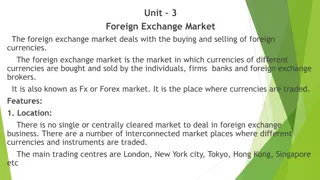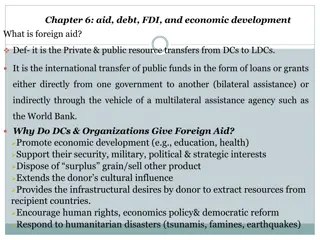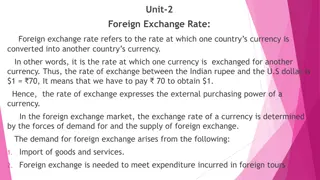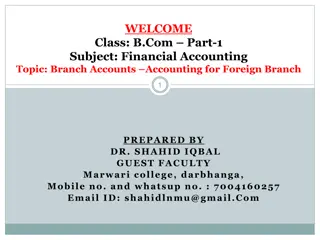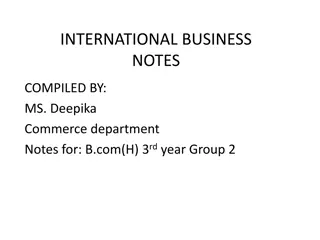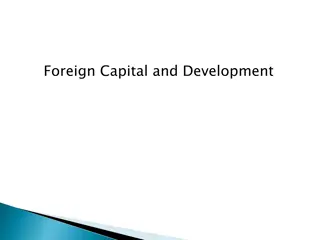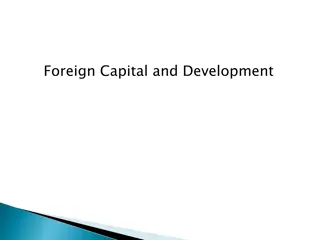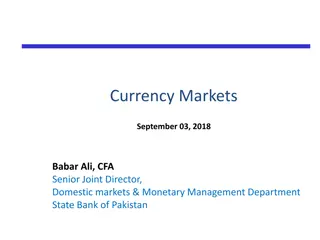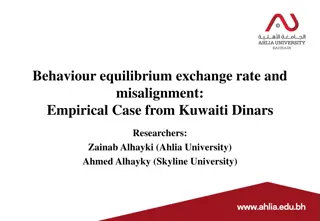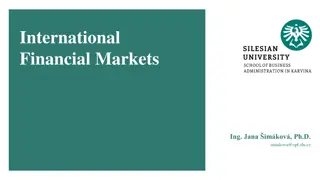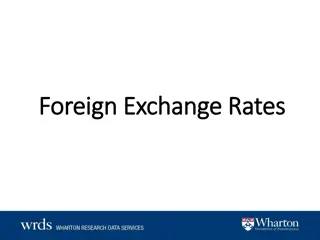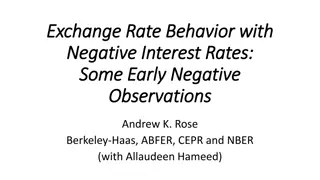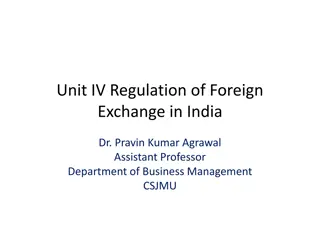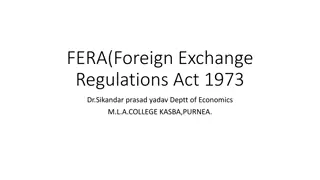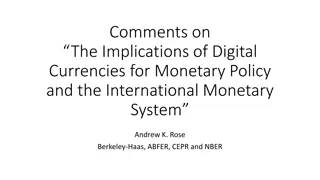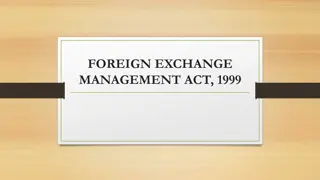Understanding Foreign Exchange and Its Impact on Economies and Currencies
Foreign exchange involves converting one country's currency to another, essential for international transactions and travel. This process highlights the significance of local and foreign currencies, exchange rates, and the impact of informal fluctuations influenced by various factors like political and economic stability.
Download Presentation

Please find below an Image/Link to download the presentation.
The content on the website is provided AS IS for your information and personal use only. It may not be sold, licensed, or shared on other websites without obtaining consent from the author. Download presentation by click this link. If you encounter any issues during the download, it is possible that the publisher has removed the file from their server.
E N D
Presentation Transcript
GRADE 11 WEEK 15 FOREIGN EXCHANGE AND ITS VALUE TO ECONOMY AND CURRENCIES
FOREIGN EXCHANGE Foreign exchange is the conversion of one country s currency into another. It is the practice whereby the currency of one country is converted into another country. Euro can be exchanged into a rand or vice-versa When tourists travels, they will be bringing their own currency into that count. In most cases, they may not be able to use it to pay for goods and services until the convert(exchange) their foreign currency to that country currency.
Foreign exchange continues Example: when foreign tourists from USA visit South Africa, they will be bringing along their foreign currency which is American dollars. I n South Africa we do not accept dollars for payment at any of the tourism facilities. American tourists need to convert(change) their foreign currency(dollars) to rands to be able to buy our goods and services.
LOCAL CURRENCY This is the currency(money) that is being used by a specific country. The people living in this county us this currency to pay for goods and services Tourists visiting this country are also expected to use this currency for payment They have to convert(change) their foreign currency to the local currency in order to pay for goods and services
FOREIGN CURRENCY This is the curency (money) that is being used by a foreign country apart from yours. People here are using this currency to pay for goods and services. Example: When you choose to visit Britain you must convert(change) your currency (rands) to their currency in order to pay for good and services.
EXCHANGE RATE This is the value of one country s currency in relation to another currency The rate is used to determine which currency is strong or weak Example: Britain pound ( ) = 17.28 : Zimbabwe dollar$ = 0.05
INFORMAL FLUCTUATIONS These are the changes that are happening with the exchange rate The exchange rate changes now and then due to different factors It can be high and sometimes low There are many factors that contribute to fluctuations in exchange rate Political and economic stability are among the factors
Fluctuations continued Example: When there are political unrest in a county, they affect exchange rate and the currency becomes weak
LESSON 2 MAJOR CURRENCIES OF THE WORLD Countries have their own unique currency that they use as their local currency Few counties do use the same currency Focus on the 5 major currencies of the world Know their names, country, code, symbol and exchange rate
Major currencies continued CURENCY US Dollar Pound sterling Euro Australian dollar Japanese Yen CODE USD GBP EUR AUD JPY SYMBOL us$ AU
LESSON 3 FACILITIES WHERE FOREIGN CURRENCY CAN BE EXCHANGED As indicated in lesson 1, tourists needs to exchange their currency o local currency in order to be able to buy good and services There are few areas where tourists can exchange their foreign currency Below is a list of facilities where currency can be exchanged: 1. Major banks
Facilities continued 2. Authorised travel agents 3. Foreign exchange kiosks 4. Major hotels 5. Cruise ships 6. Authorised foreign exchange dealers 7. Foreign exchange kiosks at airports It will be very easy for tourists to access one of the above facilities fr exchanging their currency
LESSON 4 How does money spend by international tourists benefit locals Tourists spent their money on goods and services when visiting South Africa They spent their money on transport, accommodation, food, activities and souvenirs They buy these from businesses which has employed local people Local people get salaries and wages to support their families wellbeing and education
Benefits continued Local people spent their money in local businesses which in turn contribute to country GDP


